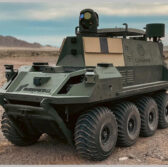IonQ, a quantum computing hardware and software company, will design a pioneering networked quantum computing system for a Department of Defense research center under a recently awarded contract.
Work on the multi-node, blind quantum system will support DOD’s Applied Research Laboratory for Intelligence and Security, or ARLIS, IonQ said Tuesday.
Under the $5.7 million contract, IonQ will primarily work on the quantum system design during the project’s initial phase. The succeeding stages, which include construction, delivery and maintenance of the system, have not yet been awarded.
ARLIS, DOD’s principal university-affiliated research center for intelligence and security, will use the innovative quantum computing system to conduct in-depth research into the cybersecurity of multi-party computation. This will include blind quantum computing protocols, which ensure that quantum computers remain “blind” to the information they process.
C.A. “Dutch” Ruppersberger, the Maryland Democratic representative who secured $40 million for the project, stressed the importance of DOD’s strategy for securing the quantum space. “With the rapid advancement of technologies like quantum and AI, we as a nation must maintain our leadership position in these developing fields while also hardening our security tools against global actors like China and Russia.”
The contract was awarded to the company through a competitive solicitation and the effort is funded by an award from the Secretary of the Air Force Concepts, Development and Management Office.
IonQ President and CEO Peter Chapman commented, “Delivering a first-of-its-kind, blind quantum computing system will enable ARLIS to test and validate communications for the DOD.”
The Maryland-based IonQ has been contracted by the federal government a number of times before. This year, the Department of Energy funded research at Oak Ridge National Laboratory to determine how quantum technology can modernize the power grid. In 2023, IonQ booked a $25.5 million contract with the Air Force Research Laboratory for barium-based trapped ion quantum computing systems.





